In Conversation With Rani Dhaschainey On Fat Acceptance, Inclusivity And More
The 31-year-old co-founder of local plus-size fashion label The Curve Cult also talks about life and business during quarantine.
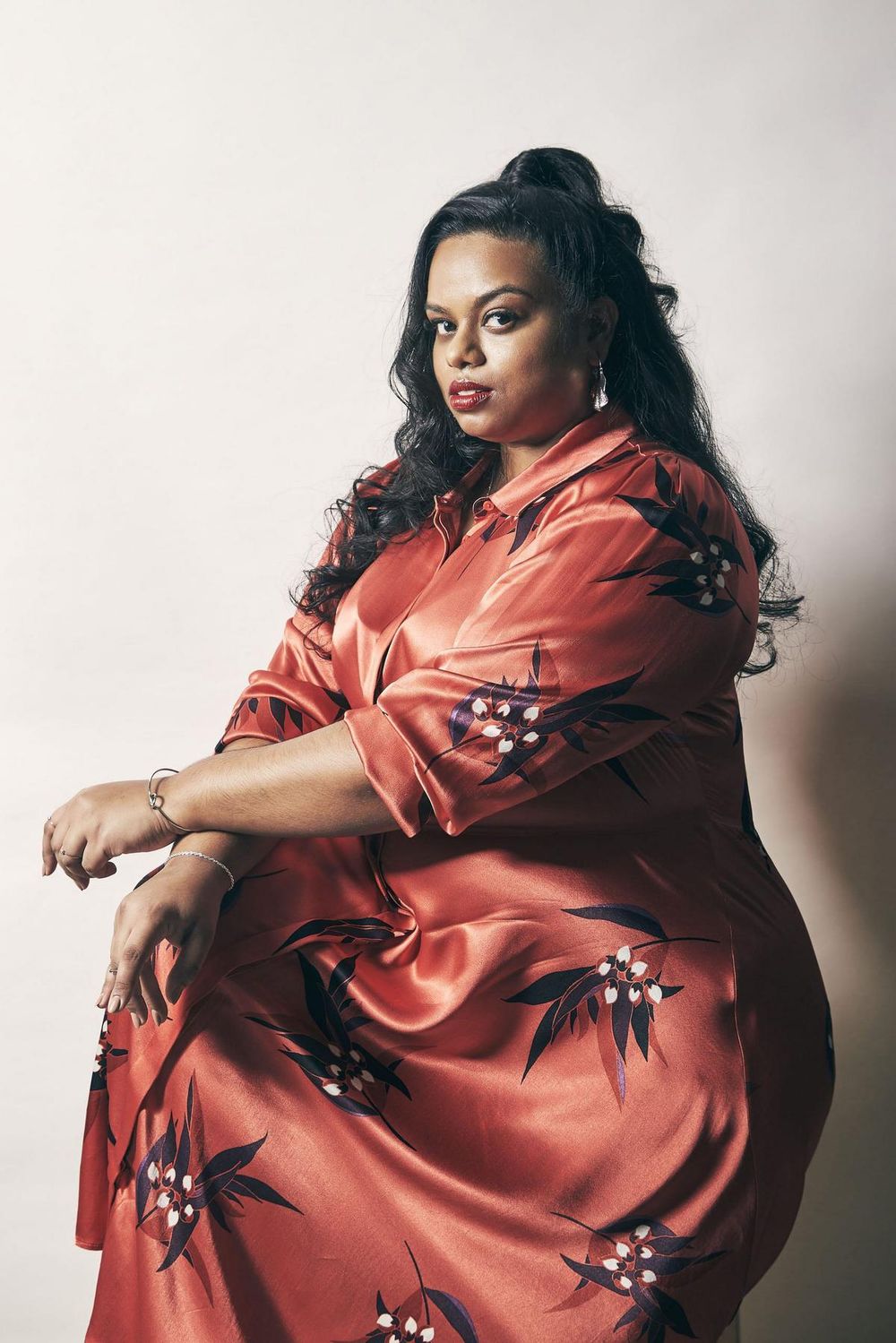
Rani Dhaschainey is fat and she owns it. To her, the word ‘fat’ is nothing but a descriptor, and she uses it to describe herself all the time. Case in point: She called herself a “fat Ariana Grande” during our photoshoot because of the hairstyle and had a good laugh about it. What she does take offence to is when it is used with the intention to hurt people. “I have a problem with the intention to hurt and not with the word that was used. Fat liberation is the ultimate goal where fat bodies are given equal respect, access and opportunities in public spaces, hiring, healthcare and other important areas,” she points out.
Related article: Lizzo Has No More Patience For Fat Shaming
Rani is also a savvy businesswoman. The 31-year-old is the beauty and brains behind local plus-size fashion label The Curve Cult, which she co-founded in 2015. She, like many small business owners in Singapore, had to quickly pivot to a digital-first model during the height of the pandemic. Together with her team, Rani used social media to not only show off her clothes with the intention of selling them, but also to celebrate voluptous bodies—curves, stretch marks and all. It was a masterclass in branding and how social networking platforms can be a brilliant tool for that. Her videos on Instagram and TikTok have collectively garnered thousands of views and likes, making her one of the most prominent plus-size advocates in the local fashion scene.
Related article: BAZAAR Talks: EIC Kenneth Goh And Modern-Day Heroine Preeti Nair On Racism And Body Positivity
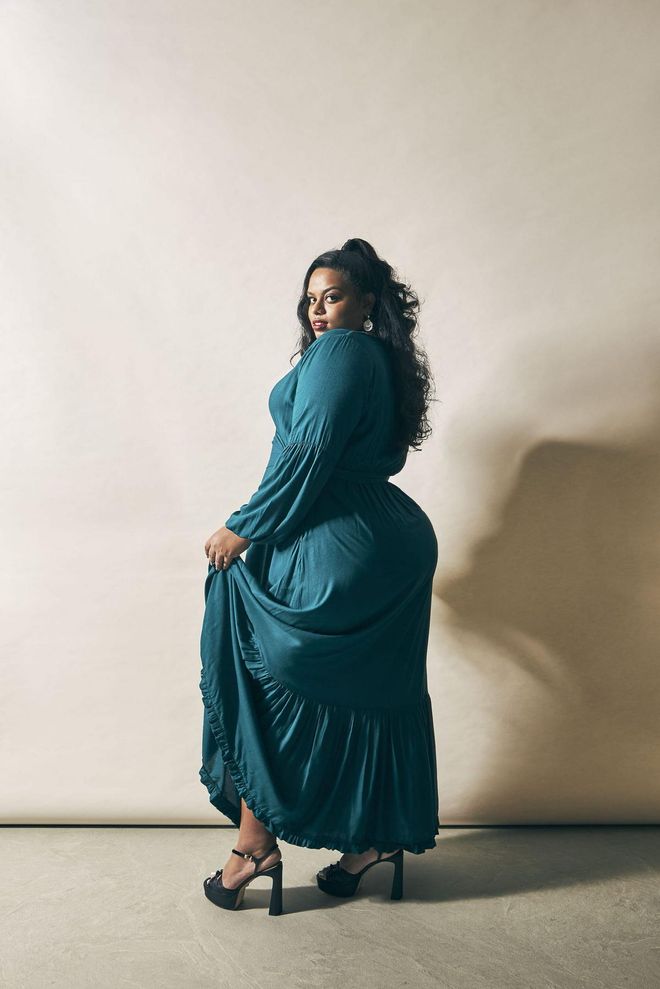
Rani Dhaschainey, co-founder of The Curve Cult. Dress, The Curve Cult. Heels, Charles & Keith. Earrings, stylist’s own. Photographed by Veronica Tay. Styled by Lauren Alexa.
In Conversation With Rani Dhaschainey On Fat Acceptance, Inclusivity And More
Looking at her now, one could easily assume that she’s always been confident, but the truth is far from it—Rani’s journey to self-love and fat acceptance is still a work in progress. “Accepting my body did not happen overnight, and it’s not a linear process. I still have many healing journeys ahead of me, and there are still periods of time when I get into a funk,” she admits. Setting up her company sparked her individual healing journey. "When I was doing research for my business in 2014, I discovered the fat acceptance movement and that was the start of my personal fat acceptance journey,” she posits.
Ahead, Rani talks about adapting her business digitally post-pandemic, her fat acceptance advocacy, personal journey, the lessons she's learned along the way and more.
Related article: Ashley Graham Pens Powerful Essay About Body Shaming
ON NAVIGATING PLUS-SIZE FASHION
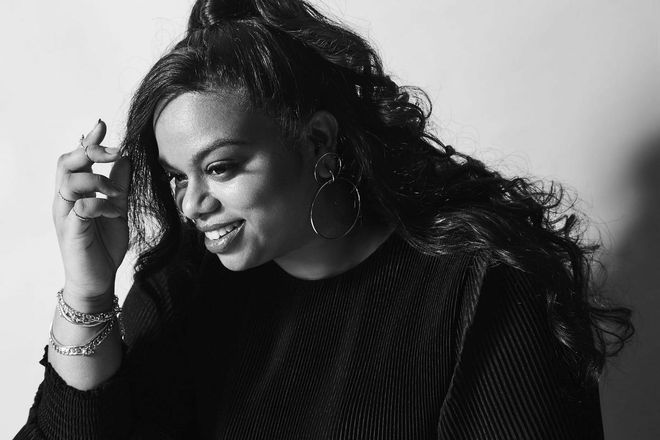
Rani Dhaschainey, co-founder of The Curve Cult. Dress, Marks & Spencer. Necklace, H&M. Necklace (worn as bracelet), H&M. Earrings and rings, stylist’s own. Photographed by Veronica Tay. Styled by Lauren Alexa.
In Conversation With Rani Dhaschainey On Fat Acceptance, Inclusivity And More
Tell us more about The Curve Cult.
When I made the decision to sell plus-size clothes, I knew that being purely interested in fashion wasn’t going to get me out of bed everyday. I wanted a purpose; something deeper to get behind and create an impact with my brand. And then I discovered the fat acceptance movement while doing research and my mind was completely blown. Gaining access to a community of fat women—who looked like me, living their best lives unapologetically—was a pivotal moment for me.
The movement was gaining a lot of traction in the West and I wanted to be a part of promoting body positivity in Asia—especially Singapore—which led to the founding of The Curve Cult. As the word ‘cult’ suggests, we have always been about creating a community for fat folk. We aim to transform mindsets, and promote fat acceptance through fat fashion.
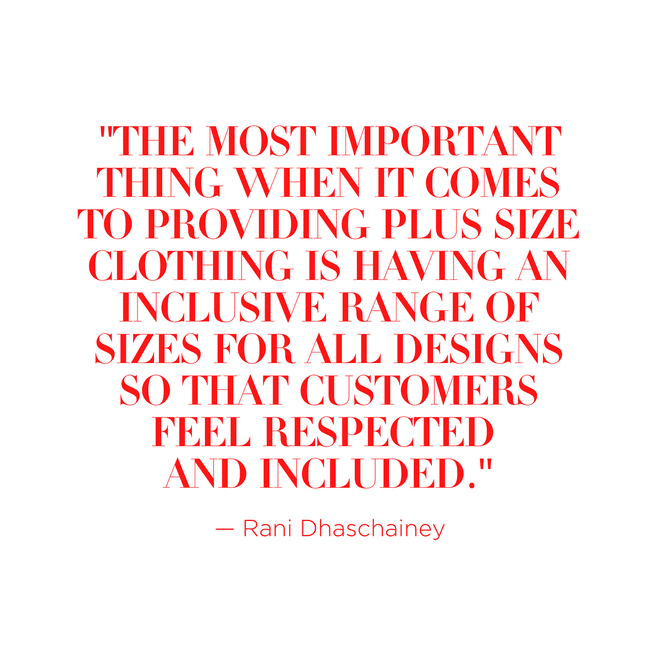
In Conversation With Rani Dhaschainey On Fat Acceptance, Inclusivity And More
What has been the most challenging and rewarding aspect of setting up and running your own business?
My main challenge has been designing clothes because I don’t have a formal fashion education. So I work with production houses with very skilled pattern makers who help us bring our visions to life. I’ve also developed systems and processes that simplify the entire production process—from concept to sample production and the final product. Initially, there was a lot of back and forth with the samples because of issues with measurements, fabric flow, stretch and fit. But with time—and learning from a lot of mistakes—I’ve started to understand the design process much better.
It lights up my heart when someone puts on an outfit [from us] and feels amazing in it; especially because plus-size women tend to be ignored by the fashion industry. So giving our customers access to fashion that fits them has been immensely rewarding. The most important thing when it comes to providing plus-size clothing is having an inclusive range of sizes for all designs so that customers feel respected and included.
Related article: Preeti Nair, aka Preetipls Is Not Just A Controversial YouTuber
ON HER RELATIONSHIP WITH FASHION AND FAT ACCEPTANCE JOURNEY
Tell us about your relationship with fashion and its evolution.
I have always loved fashion. But in the past, I used it as a way to stay safe and hidden, and not take up space. I wasn’t comfortable with my body and I used fashion to conceal parts of it that I disliked most; I would wear fit and flare dresses, loose skirts and stay away from pants to hide the shape of my thighs. Through dressing in that manner, I had hoped that my fatness would not be obvious so that I wouldn’t be ridiculed and fat shamed. Did it work? Absolutely not. I was picked on and fat shamed consistently throughout my life.
When I first started on my fat acceptance journey, I started unpacking and dismantling the beauty standards that I was subscribing to all my life. It was scary. I then turned to fashion and began experimenting with styles that I had shied away from all my life. It was so interesting to see how a mindset shift suddenly changed my experience with fashion; suddenly, the thing that kept me small and invisible, was the very thing that made me feel seen and liberated.
These days, I use fashion as an extension of myself and to express my feelings. I see dressing up and having fun with fashion as investing time on myself. Fashion holds so much transformational and healing powers.
Related article: Lizzo Is Producing A New Unscripted Amazon Series That Puts Full Figured Women Front And Center
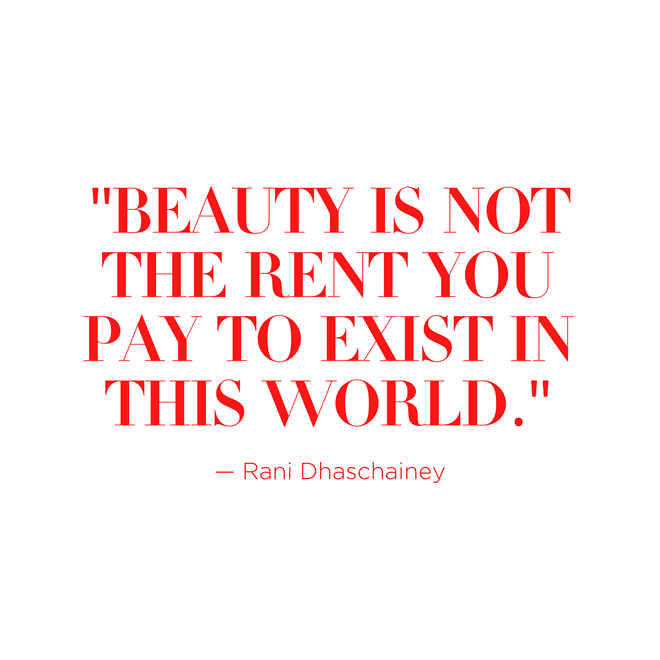
In Conversation With Rani Dhaschainey On Fat Acceptance, Inclusivity And More
What are your thoughts on the body positive movement, and what was your own journey towards self-love like?
The body positive movement is currently whitewashed—anybody and everybody is jumping on its bandwagon. Don’t get me wrong; I think it’s wonderful that all bodies are considered beautiful and accepted, but so many of us have forgotten or perhaps are unaware even that this movement was started by fat, black, queer folk fighting for liberation of fat bodies. That is why I prefer to use words like fat acceptance and fat positive movement.
My journey towards self love and fat acceptance is still a huge work in progress where some days are easier than others. Accepting my body did not happen overnight, and it’s not a linear process. I still have many healing journeys ahead of me, and there are still periods where I get into a funk. Over time, I have developed ways that help me get up and feel better, faster than before. Also, I have really great fat friendships that support me and a beautiful fat community that never fails to uplift me.
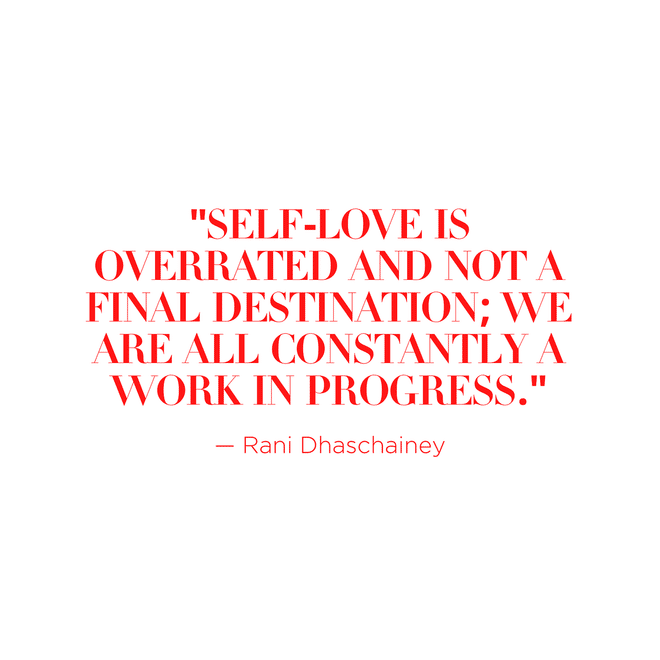
In Conversation With Rani Dhaschainey On Fat Acceptance, Inclusivity And More
Related article: Dos Swim And Paloma Elsesser Want To Wake Up The Swimwear Industry
What are your hopes for the future of fashion—locally and internationally—when it comes to fat acceptance and size inclusivity?
Ideally, I would want all types of fashion to be accessible to fat people, especially the infinifats; people sized UK 36 and above who usually require custom-fitted clothes.
Fill in the blanks:
a. Fat is… a word, a descriptor.
b. Beauty is… not the rent you pay to exist in this world.
c. Self-love is… overrated and not a final destination; we are all constantly a work in progress.
Related article: Ashley Graham On Juggling Motherhood And Work While Under Lockdown
ON BUSINESS DURING THE PANDEMIC AND BEYOND
How has the pandemic affected your business? How have you mitigated its impact and what advice do you have for other small businesses?
When the pandemic struck, we had to very quickly pivot our business to a digital landscape because not only were people buying less, they also wanted different products; clothes that were more comfortable which could be worn at home as well. We scaled down our production in terms of quantity and variety, and started producing more pieces made from natural and breathable fabrics like cotton. That said, it was still important to us to make our clothes in all sizes — that meant a lot of inventory. So we had to think of ways to minimise our loss and be very intentional about how we showed up on social media for our community; we created content that was meant to uplift, entertain and educate.
My advice is this: Think about who your consumers are and understand their fashion needs, spending and shopping behaviour—especially during a pandemic.
Related article: Jameela Jamil And Sara Sampaio Had A Very Public Argument About Body Image And Modeling
Tell us more about how you used social media to your business’ advantage during the pandemic.
Social media is a great marketing tool that allows us to connect with our customers and be part of their daily lives. We mainly use it to create awareness about our brand, spread our message and also engage with our followers to keep them interested in our product offerings. That said, the online space is noisy so an effective content strategy is key to getting in front of your audience on a daily basis. It’s also a great way to develop relationships with your customers as well as to understand them better so that you can serve them better.
Another important point to consider is that we do not own the presence that we have on social media; how far we reach our audience is ultimately determined by the platform’s algorithm. So it’s important to constantly be developing alternative ways to connect with your audience. For instance: Building your email list for Electronic Direct Mail (EDM) marketing.
What can we expect from you and The Curve Cult in the near future?
To be more than a fat fashion brand. Expect more community building, fat acceptance advocacy and a virtual safe space in addition to the physical safe space we already have. We currently design and manufacture our clothes in sizes UK 14 to UK 28, and we will be extending to UK 30 from September 2021 onward.
Photography: Veronica Tay
Producer: Navin Pillay
Stylist: Lauren Alexa
Hair and makeup: Sha Shamsi
Stylist's assistant: Nadia Lim